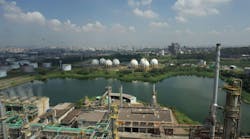Valero Energy Corp. is getting into renewables, having bought several ethanol plants earlier this year and having built a wind farm in northwest Texas near its McKee refinery.
The wind farm is scheduled to operate at full capacity in August. Valero, San Antonio, expects to generate 50 Mw/hr of electricity when the wind is blowing around Sunray, Tex., which will be enough to run the refinery 40 miles north of Amarillo.
The wind farm, consisting of 33 wind turbines at the 166,600 b/cd Sunray refinery, cost $115 million, said Valero spokesman Bill Day.
It’s hard to know when the turbines will pay for themselves because they’re compared against the cost of electricity generated with natural gas, and natural gas costs fluctuate significantly.
“We built the wind farm there because we had plenty of open space around the refinery. We own the land,” Day said. “It’s relatively inexpensive over the long term.” He noted that the refinery will remain reliant on the electricity grid when the wind is not blowing.
In March, Valero announced plans to buy seven ethanol plants from VeraSun Energy for $477 million. The sale was approved by a Delaware bankruptcy judge. VeraSun of Sioux Falls, SD, filed for Chapter 11 bankruptcy protection in October 2008.
The refiner is open to possibly buying more ethanol plants, Day said, adding that the company “got the best that was available at that time. These ethanol plants were available at 30% of what it would have cost to build them.” Valero operates the ethanol plants under a subsidiary.
Valero formed a group in 2008 called the Alternative Energy & Project Development Group, headed by Jim Gillingham, a senior vice-president, who has been plant manager at some of Valero’s largest refineries.
AEPD has been making small investments in biofuels companies that are working on technologies like producing cellulosic ethanol, making fuel from landfill waste, and making biofuels from algae.
Although the greatest percentage of Valero’s revenues will continue to come from the refining and marketing side of the business, alternative energy is growing rapidly and is becoming an important part of Valero’s business.
Expanding the value chain
Deloitte LLP recently issued a report recommending that refiners capture more of the emerging value chain for transportation fuels.
Roger Ihne, a principal with Deloitte in Houston, said US refining margins are likely to shrink. Valero agrees with this scenario, Day said.
The US renewable fuel standard calls for 11.1 billion gal of renewable fuel to be blended into gasoline this year, escalating to 36 billion gal by 2022.
“Although somewhat ironic, refiners can leverage their operations experience and capital to embrace the regulations designed to significantly reduce the consumption of traditional transportation fuels,” Ihne said in a study entitled, “A Tsunami of Change Bearing Down on the Refining Industry.”
Noting that regulatory changes can provide business opportunities, Ihne said Valero is an example of a traditional refiner that is positioning itself into the emerging fuels market.

